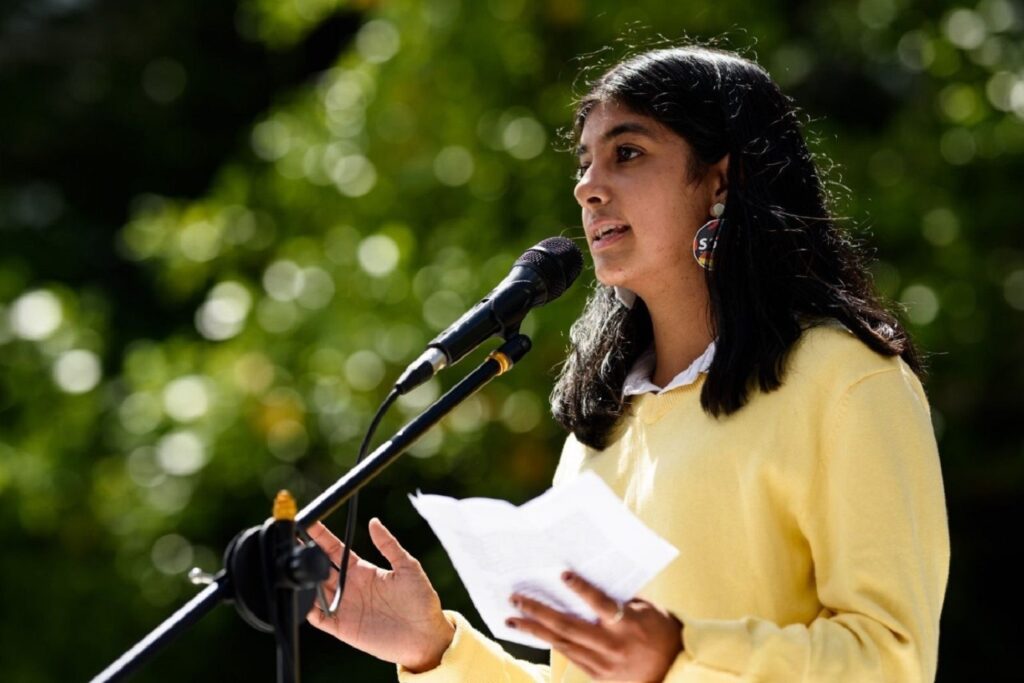At just 16 years of age– still a student in high school– Anjali Sharma was the lead litigant of 2021’s Sharma vs Environment Minister, a legal case which successfully established that the Environment Minister owes all young people a duty of care to protect them from the impacts of climate change.
After this ruling, Sharma launched a campaign to legislate this duty of care through the Federal Parliament, and successfully saw a bill for this tabled in the Senate.
As a prominent voice for the climate rights of her generation, Sharma was recognised as the 2023 Emerging Leader in Climate & Sustainability at the Women’s Agenda Leadership Awards in October with judges noting her particular brand of “courageous leadership”.
Here, Anjali tells Women’s Agenda what this award and recognition mean to her, and why establishing a duty of care for young people is so critical for climate justice.

How does it feel to win?
It’s surreal to win and I feel so honoured! To win an award from Women’s Agenda, who has done such important work in the space of female empowerment, and with past Women’s Agenda Leadership Awards having been given to some of my role models, I feel really grateful to win. It’s a boost of motivation and reassurance that I’m on the right track, in a sector that can often feel quite devoid of hope and good news, especially as a young person.
You launched a campaign to establish a duty of care owed by politicians to young people, and successfully saw a bill tabled in the Senate to do so. Tell us briefly why this is critical for climate justice and how people can get involved.
We all know and honour our duties of care to each other in daily life. A road user has a duty to another, a doctor has a duty to their patient, a teacher to their student. But as the law stands, there is no policy mechanism that compels politicians to keep in mind the effects that their decisions will have on young people in the context of climate change. This duty does not exist, and this allows politicians to continue to make climate-wrecking decisions that aren’t in the best interests of young people, falling victim to short termism and election-cycle thinking, rather than adopting a long term view.
Young people deserve to be handed a world in which to create our lives which is safe and liveable, and policy mechanisms should exist which facilitate that. That’s why this duty of care is so important! To pass, we have to show the government that there is a broad base of support for it from around the country, and so people can help us do that by signing our petition.
Additionally, the bill is before a Senate Inquiry right now for review, and people can make a submission, and there are resources on our website to help people make a compelling submission. Lastly, call or email your MP and tell them you want to see this bill put into action!
The judges described your climate justice work as having “broad reaching and profound implications for the whole country”. What does this recognition mean to you?
The statement from the judges is recognition that this bill, if passed, could change the way that decisions are made around climate change. This is exactly what I want to see happen, because I believe that the decision-making process currently is not serving young people, and so this statement makes me feel really happy that my aim and work is being recognised.
What are you hoping to achieve in the next twelve months, and what do you foresee to be the greatest barriers you’ll face to accomplishing it?
I want this bill to pass when it’s brought on for debate mid 2024. But the obstacle is that it can so easily be voted down by the government, which holds a majority in the lower house. As the Australian public, we cannot let them feel comfortable enough to do this and must hold them accountable to making policy decisions that match their rhetoric on climate change. They’ve said that they want to secure a safe climate future for young people, and we must pressure them to take this opportunity to do it, rather than let them think that they can get away with voting the bill down.

